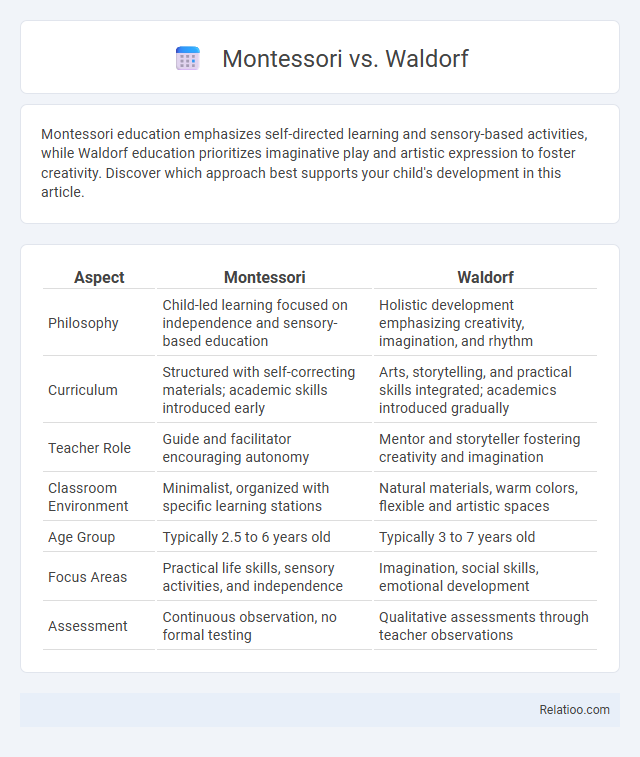Montessori education emphasizes self-directed learning and sensory-based activities, while Waldorf education prioritizes imaginative play and artistic expression to foster creativity. Discover which approach best supports your child's development in this article.
Table of Comparison
| Aspect | Montessori | Waldorf |
|---|---|---|
| Philosophy | Child-led learning focused on independence and sensory-based education | Holistic development emphasizing creativity, imagination, and rhythm |
| Curriculum | Structured with self-correcting materials; academic skills introduced early | Arts, storytelling, and practical skills integrated; academics introduced gradually |
| Teacher Role | Guide and facilitator encouraging autonomy | Mentor and storyteller fostering creativity and imagination |
| Classroom Environment | Minimalist, organized with specific learning stations | Natural materials, warm colors, flexible and artistic spaces |
| Age Group | Typically 2.5 to 6 years old | Typically 3 to 7 years old |
| Focus Areas | Practical life skills, sensory activities, and independence | Imagination, social skills, emotional development |
| Assessment | Continuous observation, no formal testing | Qualitative assessments through teacher observations |
Montessori vs Waldorf: An Introduction
Montessori education emphasizes self-directed learning, hands-on activities, and individualized pacing, fostering independence and practical skills. Waldorf education prioritizes imaginative play, artistic expression, and social-emotional development, creating a nurturing environment aligned with developmental stages. Your choice between Montessori and Waldorf should consider your child's learning style and developmental needs for optimal growth.
Philosophical Foundations Compared
Montessori education emphasizes self-directed learning and sensory-based materials, fostering independence and practical life skills rooted in Dr. Maria Montessori's scientific research. Waldorf education, developed by Rudolf Steiner, centers on imaginative play, artistic expression, and holistic nurturing aligned with developmental phases, prioritizing creativity and spiritual growth. Understanding Your child's unique developmental stage is vital to selecting the philosophy that best supports their cognitive, emotional, and social needs.
Classroom Environment Differences
Montessori classrooms emphasize a prepared environment with child-sized furniture, open shelves of sensory-based materials, and mixed-age groups fostering independence and self-directed learning. Waldorf environments feature natural materials, warm colors, and thematic decorations designed to stimulate imagination and creativity through structured, teacher-led activities. Developmental stage classrooms adapt their setup to the learners' cognitive and physical needs at each stage, prioritizing age-appropriate resources and flexible seating to support growth milestones and social-emotional development.
Teaching Methods and Curriculum
Montessori teaching methods emphasize self-directed learning with hands-on materials, promoting independence through individualized pacing aligned with developmental stages. Waldorf education uses a holistic curriculum integrating arts, storytelling, and imagination to nurture creativity and social skills, following age-specific developmental phases. Developmental stage approaches tailor instruction based on cognitive and emotional milestones, ensuring curricula meet children's readiness and promote optimal growth.
Role of the Teacher: Guide vs Facilitator
The role of the teacher in Montessori education is primarily as a guide, providing structured materials and individualized lessons that support Your child's self-directed learning. In Waldorf education, the teacher acts as a facilitator, nurturing creativity and imagination through artistic and experiential activities tailored to developmental stages. Understanding these distinct roles helps you choose an approach that best aligns with Your child's learning needs and developmental progress.
Child Development Approach
Montessori emphasizes self-directed learning and hands-on activities tailored to Your child's individual developmental pace, fostering independence and practical skills. Waldorf education focuses on holistic development through artistic expression, imagination, and rhythm, supporting emotional and social growth aligned with developmental stages. Both approaches respect developmental milestones but differ in methods: Montessori prioritizes structured environments while Waldorf integrates creativity and storytelling to nurture cognitive and emotional development.
Materials and Learning Tools
Montessori education emphasizes hands-on, self-correcting materials like wooden blocks, bead chains, and practical life tools designed to foster independence and fine motor skills. Waldorf pedagogy utilizes natural, open-ended materials such as beeswax, wool, and unpainted wooden toys to stimulate creativity and imaginative play aligned with developmental rhythms. Developmental stage approaches prioritize age-appropriate learning tools that correspond to cognitive and motor milestones, integrating sensory-based items and scaffolding techniques to support each child's evolving abilities.
Socialization and Community Focus
Montessori education emphasizes mixed-age classrooms fostering peer learning and independence, promoting socialization through collaborative activities and respect for individual pace. Waldorf education prioritizes community building through group projects, artistic expression, and storytelling, nurturing empathy, cooperation, and social responsibility within a strong class cohort. Developmental stage theories underline that socialization evolves with age, highlighting the importance of tailored social experiences that align with children's cognitive and emotional maturation for effective community integration.
Parental Involvement in Each Method
Montessori education emphasizes hands-on learning with parents actively supporting independence and self-directed activities at home. Waldorf education encourages deep parental involvement through storytelling, artistic projects, and shared rituals that foster creativity and emotional development. Developmental stage theories guide parents to tailor interactions and learning experiences to their child's specific cognitive and emotional milestones.
Choosing the Right Approach for Your Child
Choosing the right approach for your child involves understanding key differences between Montessori, Waldorf, and Developmental Stage methods. Montessori emphasizes self-directed learning with hands-on materials, fostering independence and practical skills, while Waldorf focuses on imaginative play, creativity, and social-emotional development through arts and storytelling. Aligning your child's developmental needs and learning style with these educational philosophies ensures a supportive and enriching environment tailored to their growth.

Infographic: Montessori vs Waldorf
 relatioo.com
relatioo.com